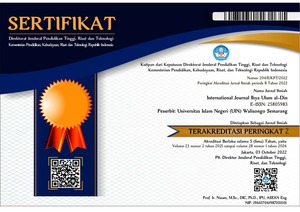Magnum Opus of Mohammed Arkoun; Cultural Resilience Amidst Pluralism
DOI:
https://doi.org/10.21580/ihya.25.2.18235Keywords:
Magnum Opus of Arkoun's thought, Culture of Tolerance, PluralismAbstract
The world faces a multidimensional crisis, with cultural, ethnic, racial, linguistic, and ethnic diversity giving rise to various issues. Wars in different parts of the world continue to result in bloody events and casualties. Preventive efforts are needed to address these problems, including promoting a culture of tolerance. Mohammed Arkoun was a figure and philosopher of pluralism who advocated and conveyed ideas about pluralism. The weaknesses of classical Islamic theological thinking become apparent when confronted with the empirical social reality of human life that continues to evolve with the advancement of science and technology. Mohammed Arkoun, an intellectual fNrom Algeria, attempted to comprehensively reinterpret the framework of Islamic thought, including aspects such as theology (kalam), Sufism, jurisprudence (fiqh), ethics, and exegesis (tafsir). Mohammed Arkoun expressed that Islam can succeed if Muslims adopt an open attitude toward pluralistic thinking, as during the early Islamic period and the Middle Ages. This pluralism can be realized if religious understanding is based on human values, allowing Muslims to interact with anyone. This research uses a qualitative method with a literature review study type, gathering data from various references, books, and articles related to Mohammed Arkoun's magnum opus: the study of cultural tolerance resilience amid pluralism. According to Arkoun, debates based on cultural diversity, thought, and theology in classical Islam lead to profound interpretations of the Quran and laws based on sacred texts.
Downloads
References
Alfan, M. F. dan M. (2021). Dialog Pemikiran Timur Barat. Pustaka Setia.
Anas, M. (2019). Gagasan Baru Tentang Wahyu: Ke Arah Dialog Kritis Antaragama (Membangun Masyarakat Kitab Bersama Mohammed Arkoun). Islamic Insights Journal, 1(1), 61–81. https://doi.org/10.21776/ub.iij.2019.001.01.7.
Arkoun, M. (1987). Al-Fikr al-lslami : Qira ah Ilmiyyah, terjemahan Hasyim Shalih. Markaz al-lnam al-Qaumi.
Arkoun, M. (1991). Lectures du Coran. Alef.
Arkoun, M. (1999). Min Faisal Tafriqah ila al-Maqal Aiana al-Fikru al-Islami al-Muasir, terj. Hasyim Shalih dan Amin Abdullah, Membongkar Wacana Hegemonik Dalam Islam dan Post Modernisme. Al-Fikr.
Arkoun, M. (2021). Islam Kontemporer Menuju Dialog Antara Agama. Pustaka Pelajar.
Baedhowi. (2008). Humanisme Islam: Kajian Terhadap Pemikiran Filosofis Muhammad Arkoun. Pustaka Pelajar.
Fadholi, M., & Solikhin, M. (2018). Kritik Arkoun Atas Epistemologi Islam. Islamic Review : Jurnal Riset Dan Kajian Keislaman, 7(1), 17–31. https://doi.org/10.35878/islamicreview.v7i1.136.
Hick, J. (1963). Philosophy of Religion. Prentice Hall.
Hjerm, M., Eger, M. A., Bohman, A., & Fors Connolly, F. (2020). A New Approach to the Study of Tolerance: Conceptualizing and Measuring Acceptance, Respect, and Appreciation of Difference. Social Indicators Research, 147(3), 897–919. https://doi.org/10.1007/s11205-019-02176-y.
Ilyas, H. (2002). Pandangan Muslim Modernis Terhadap Non-Muslim, Studi Pandangan Muhammad Abduh dan Rasyid Ridla Terhadap Ahlul Kitab dalam Tafsir Al-Manar. Disertasi, UIN Sunan Kalijaga Yogyakarta.
Imronudin, I., & Muhammad, R. (2023). Discourse from the Perspective of Mohammed Arkoun: An Examination of the Values of Interfaith Dialogue. Potret Pemikiran, 27(1), 94. https://doi.org/10.30984/pp.v27i1.2367.
M, H. N. (2019). Dari Emanasi Hingga Pluralisme. Alauddin University Press,.
Mohammad Arkoun, D. (2019). , Orentalisme Vis avis Oksidentalisme. Pustaka Firdaus.
Nemo, P. (2018). Le pluralisme scolaire. Persona y Derecho, 2004, 505–550. https://doi.org/10.15581/011.31867.
Rizki, N. J., Yurna, Y., Erviana, R., Nurafifah, S., & Babullah, R. (2023). Metodologi Studi Islam (Perspektif Arkoun Dan Ibrahim M. Abu Rabi). Jurnal Pendidikan Indonesia (JOUPI), 1(3), 147–159.
Soekarba, S. R. (2006). Kritik Pemikiran Arab: Metode Dekonstruksi Mohammen Arkoun. 8, 89.
Sourush, K., & Musa, M. (2023). Pluralisme Quranik Perspektif Hamka. 09(02), 14–22.
Stoeckel, F., & Ceka, B. (2022). Political tolerance in Europe: The role of conspiratorial thinking and cosmopolitanism. European Journal of Political Research, 1971, 699–722. https://doi.org/10.1111/1475-6765.12527.
Syuja’Zhafran, R. (n.d.). Moralitas Masyarakat Modern Perspektif Mohammed Arkoun. FU.
Verkuyten, M., & Kollar, R. (2021). Tolerance and intolerance: Cultural meanings and discursive usage. Culture and Psychology, 27(1), 172–186. https://doi.org/10.1177/1354067X20984356.
Downloads
Published
How to Cite
Issue
Section
License
By submitting an article to the journal, the author(s) agree to transfer the published article's copyright to the journal, which will act as the publisher. This means the journal will have the right to publish the article in various forms, including reprints. The journal will maintain the publishing rights to the published articles.
This work is licensed under Creative Commons Attribution-ShareAlike 4.0 International License.
In line with the license, authors and third parties (readers, researchers, and others) are allowed to share and adapt the material. In addition, the material must be given appropriate credit, provided with a link to the license, and indicated if changes were made. If authors remix, transform or build upon the material, authors must distribute their contributions under the same license as the original.



